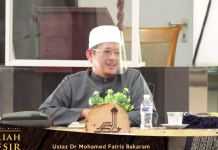This article is a summary of takeaways from Ustaz Dr Mohamed Fatris Bakaram’s Tafsir Lecture at Darul Makmur Mosque FB on 10th May 2020. Summaries of previous lectures on Surah Maryam and Surah Taha can be found here. This lecture is a continuation of last week’s lecture after Surah Al Anbiya’ verses 1 to 4.
Brief Recap of Previous Lecture
قَالُوا حَرِّقُوهُ وَانصُرُوا آلِهَتَكُمْ إِن كُنتُمْ فَاعِلِينَ
They said, ‘Burn him and defend your gods, if that is what you can and want to do.’ [21:68]
In the previous lecture, we discussed the story of how Prophet Ibrahim AS had used his intelligence to convey the message of One God to his people. In their absence, Prophet Ibrahim AS had destroyed all of the idols that they worshipped except for the largest one. When questioned about it, Prophet Ibrahim AS accused the largest idol of destroying the other idols. He then asked his people to consult their broken “gods” about the incident. The people were enraged by his actions and ordered for him to be thrown alive into a fire as punishment.
The Cooled Fire
قُلْنَا يَا نَارُ كُونِي بَرْدًا وَسَلَامًا عَلَىٰ إِبْرَاهِيمَ
We (Allah) said: “O fire! Be you coolness and safety for Ibrahim!” [21:69]
Allah SWT is the Master of all that is the heavens and the Earth, He is the Master of Prophet Ibrahim AS and of the fire. Nothing is impossible to Allah SWT. Allah SWT ordered the fire to become cool to protect Prophet Ibrahim AS from getting burnt.
Many scholars have discussed this incident. According to them, Prophet Ibrahim AS was in Iraq at that point of time. Iraq had been ruled over by King Namrud. When the command to burn Prophet Ibrahim AS was given, a massive pit was dug and filled with firewood. After the fire had been lit and the intense heat of the flames was apparent, they threw Prophet Ibrahim into the fire. Prophet Ibrahim AS had been unscathed as the fire burned on until it was reduced to coal and ashes.
Stories in Tafsir Books
My dearest brothers and sisters, if you look at the books of tafsir written by the scholars, there are many additional stories to the verses of the Qur’an. Many of these stories are accompanied by their chain of transmission (i.e. we know which companions narrated the stories). However, not all of these stories have a sahih (authentic) chain of transmission.
Some tafsir scholars only publish sahih stories in their books in order to preserve the reliability of their texts. Others choose to include all stories linked to the verses, whether they have sahih or dha’if (weak) chains of transmission, for as long as the stories meet the condition of not going against the fundamental principles of Islam. For example, stories that go against the Greatness of Allah SWT (e.g. stories which imply that Allah SWT forgot) or stories that show the prophets of Allah SWT demonstrating improper conduct will not be included. It is important for us to note also, that some scholars do include these very weak narrations in their books. However, they will end the narration with a note to alert readers of the weaknesses of the story. The aim of this is to remind and alert the readers, in order that they may take precaution when coming across these stories.
Each scholar has their own deliberation process on what they consider as important to present in their texts. There are certain tafsir scholars who choose to present all stories related to the verses presented without highlighting the authenticity of these stories. Scholars who study these texts say that some of the aims of the authors doing this is so that they may surrender the responsibility of authenticating the stories to other scholars. This is in the hopes that the reader may be able to do his own research and find authentic narrations that may support these stories. The scholars of these books hope that the narrations and stories may not be lost from knowledge.
When it comes to knowledge, we need to know that the knowledge that exists is not limited to that which is presented in published contemporary texts. There is a lot of knowledge that is still yet to be explored that is kept within the texts and manuscripts of classical scholars of the past. These texts are being kept in old libraries waiting to be studied by scholars.
Coming back to the story of the fire and Prophet Ibrahim AS, we need to note that at times we come across stories that seem too extreme or too “magical” to be believed. In these cases, do not be too quick to believe the stories. Leave it to the experts to decide whether or not these stories are authentic. There are however some stories that have been narrated by several scholars. I will mention them here because I do not see them as being conflicting with our fundamental beliefs.
Story One: The Angels Ask Allah SWT
In one story, just before Prophet Ibrahim was thrown into the fire, the angels said to Allah SWT, “Ibrahim is all alone being thrown into the fire. Could we help him out?”. The angels could protect Prophet Ibrahim from harm or cause the destruction of his people. We have heard of the story in Surah Al-Fil where the army of Abraha, which came to destroy the Ka’bah on elephants, was wiped away by birds carrying burning stones. Allah SWT is able to protect whatever and whomever He pleases in any way possible.
At that point of time, Prophet Ibrahim AS had no followers to support him. The angels asked if they could provide the help he needed. Allah SWT replied saying that if Prophet Ibrahim AS were to ask the angels for help, they would be allowed to help him. However, if he does not seek help from anyone but Allah, then they are to leave him AS. It will then become something that is between Allah SWT and Prophet Ibrahim AS.
Story Two: Jibrail Asks Ibrahim AS
Another narration continues the story where Angel Jibrail goes to Prophet Ibrahim AS and asks him why he does not seek help. Prophet Ibrahim responds saying, “Who do you want me to seek help from? If it is from you, O Jibrail, then I am in no need of your help. I only seek from Allah SWT.”.
Angel Jibrail then replies, “If you only seek from Allah SWT, then why do you not ask?”. Prophet Ibrahim AS responds saying, “Allah is All-Aware of my situation, my needs and my wants.”.
Prophet Ibrahim AS knew that Allah SWT is the Creator of all things and that He has full control over all of creation. It is Allah SWT who made fire hot and it is only Allah SWT who can make fire cool.
Allah Saves Prophet Ibrahim
وَأَرَادُوا بِهِ كَيْدًا فَجَعَلْنَاهُمُ الْأَخْسَرِينَ
And they devised a plot to harm him, but We made them the greatest losers. [21:70]
The word “Kaidan” used to mean “plot a plan”, was also used in Verse 57 of Surah Al-Anbiya’ when Prophet Ibrahim AS said that he would plot a plan against the idols. Prophet Ibrahim AS’ plan was successfully implemented, seeing that the idols had been destroyed. As a result of his plan, he was being sentenced to be burnt alive. The plan of his people to kill him, however, did not succeed. In fact, Allah SWT mentions that they became the biggest losers because of this plan. They lost both in this world and in the hereafter.
وَنَجَّيْنَاهُ وَلُوطًا إِلَى الْأَرْضِ الَّتِي بَارَكْنَا فِيهَا لِلْعَالَمِينَ
We saved him and Lut (and sent them) to the land We blessed for all people, [21:71]
Even though Prophet Ibrahim AS was not burnt in the fire, he became known amongst his people as a disbeliever of their faith, someone who is a threat to their lifestyle. So Allah SWT rescued him from the cruelty of his people.
Prophet Lut AS was mentioned because he was the nephew of Prophet Ibrahim AS and lived in the lifetime of Prophet Ibrahim. He too was made a prophet and saved from his people. They were both moved to another land along with the few followers that they had.
There are a few opinions amongst the scholars who discuss where this land is. Some hold the opinion that the land is Egypt, others say that it is in Palestine, others say it is a part of Sham (a vast area of land that includes part of Syria, Lebanon, Jordan, and Palestine). Only Allah SWT knows exactly where the location was. What we do know for sure is that both these Prophets were saved when they migrated to another land.
Prophet Ibrahim’s Lineage
What follows is that Prophet Ibrahim AS gets married to Sayidatina Sarah. They did not have any children for years. After his marriage to his second wife, Sayidatina Hajar, he was gifted his first child, Prophet Ismail AS. At this point of time, the story goes that Sayidatina Sarah got jealous of Sayidatina Hajar. Prophet Ibrahim then brought Hajar and her new-born son to Mecca where he left them in the middle of barren, empty desert land. There, the incident of the Zamzam water occurred and this started the foundations of the village of Mecca.
After years, Prophet Ibrahim received good news from an angel of a new child to be born from Sayidatina Sarah. This news caught Sarah by surprise so much so that she laughed! She was at that time, an elderly woman. Prophet Ibrahim’s second son, Prophet Ishaq was born soon after.
وَوَهَبْنَا لَهُ إِسْحَاقَ وَيَعْقُوبَ نَافِلَةً ۖ وَكُلًّا جَعَلْنَا صَالِحِينَ
And We bestowed upon him Ishaq, and Yaacob in addition. Each of them We made righteous. [21:72]
The word “naafilah” means ‘as an addition’. One opinion states that this word refers to ‘an additional child’. As you remember, Prophet Ibrahim had been childless for many years because Sayidatina Sarah had been infertile. Years after the birth of Ismail through Hajar, Sarah had already reached old age and no longer held any expectation of bearing a child. Despite this, Allah SWT gifted Prophet Ibrahim with Prophet Ishaq through Sayidatina Sarah. This was in addition to his first child already being born.
The second opinion suggests that this “addition” comes in the means of ‘honour’. Prophet Ibrahim AS was already a Prophet with high honour. This was despite his uncle being an idol-worshipper. Prophet Ibrahim AS grew up being the only believer amongst his people. Allah SWT increased him in honour by blessing him with Ismail and Ishaq, both of whom became prophets. In fact, through Prophet Ishaq’s son, Prophet Yaacob, came many other prophets such as Prophets Musa and Isa AS. From the bloodline of Prophet Ismail AS came Prophet Muhammad SAW.
People of Honour
The descendants of Prophet Ibrahim AS were honoured by Allah and their honour was completed by their righteousness as stated in this verse. This tells us that our bloodline holds no worth, if not for a person’s righteous deeds. Somebody could be born of the best and most righteous of fathers, however if he himself is not righteous, he will not hold a high position of honour in Allah’s eyes.
We know that there is honour in the bloodline of Prophet Muhammad SAW. In fact, when we give the salawat and salam to him SAW, we are told to complete the selawat by also sending the selawat to his family. We say:
اللّهُمّ صَلّ عَلَى مُحَمّدٍ وَآلِ مُحَمّدٍ
O Allah send blessings upon Muhammad and the family of Muhammad
There is honour in being a descendant of Prophet Muhammad SAW. However, if an individual who comes from the lineage of Muhammad SAW decides to choose a path of disobedience to Allah SWT, then he will not receive any goodness from his lineage. He is cut off from the nafilah because he is missing the righteous deeds which makes him amongst the Soliheen (Righteous people).
People Without Honourable Lineage
One might say that they do not have any hopes of being amongst the Soliheen because they do not come from the lineage of honourable people. However, we need to remember that at the end of the day, honour that comes from Allah is given based on a person’s efforts. Lineage is an additional benefit; It is given to whomever Allah SWT pleases. Nonetheless, it does not guarantee a person’s high status with Allah SWT.
There were narrations of the companions of Prophet Muhammad SAW coming to him saying, “O Rasulullah, these wealthy men get so much goodness that we do not. We cannot give Sadaqah (charity) to benefit people.”. Rasulullah SAW replied saying that even though they were unable to give Sadaqah in wealth, they could give Sadaqah in many other ways. For example, they could help other people using their energy, and they could do Zikrullah (remembrance of Allah) through the tasbih, tahmid, tahlil and takbir. These Zikr have a good impact not just on ourselves but on the wider community. Allah SWT will shower down goodness upon the people.
Hadith: Gatherings of Goodness
I remember a sahih narration that was, if I am not wrong, narrated by Imam Muslim. I will perhaps find the source and give it to you in the next session. In the narration, it states that Allah SWT sends angels around the world to look for His servants who sit in gatherings of goodness (some examples are gatherings of Zikrullah, of knowledge or of Qur’anic recitation). These angels will take note of the attendees and report them to Allah SWT.
Allah SWT will ask the angels what His servants are asking of Him. The angels will say, “O Allah, they are asking for Your Paradise”. Allah SWT will ask the angels, “Have these servants of Mine seen Paradise before?”. The angels will reply, “No, they ask of it even though they have never seen it”. Allah SWT will then say, “Can you imagine what it would be like if they have seen Paradise for themselves?”. These people will perform goodness with even more motivation than they already have.
Allah SWT then asks, “These servants of Mine, what are they asking for protection from?”. The angels will reply, “O Allah, they are asking for protection from Your Hellfire”. Allah SWT will ask, “Have they seen My Hellfire before?”. The reply will be, “No, they have never seen Hellfire”. Allah SWT will then say, “Can you imagine what it would be like if they have seen Hellfire for themselves?”.
The Angels will then say, “These servants gather and make Istighfar and Taubah, seeking Your Forgiveness, O Allah”. Allah SWT will say, “O angels, know that I have already forgiven them, I have granted all of their requests, and I have protected them from Hellfire”. The Angels will reply, “But O Allah, amongst them, there is a misplaced person.” There is someone who came not with the intention of being in a gathering of goodness. He just happened to be there at that point of time. Allah SWT will reply, “My Mercy is endless even to that servant. For I do not disappoint anyone who remembers Me, and I do not disappoint the one who sits with him.”
Subhan Allah, how extensive is the Mercy of Allah SWT! Going back to the story of the needy companions of Prophet Muhammad SAW, who complained that they did not have wealth to give in charity. Rasulullah SAW had informed them that amongst the Sadaqah that they could give was to make Zikr of Allah through their tasbih, tahmid and takbir. Our Zikr may seem to be personal, something that is between us and Allah SWT. However, the Mercy and goodness that comes from Zikr will also be felt by those around us – our family, our neighbours, and our friends – if not in large quantities, then in small sprinkles of quantity. This is a means for us to give Sadaqah to people.
Allah’s Justice Comes from Love and Mercy
One might say that it is unfair for someone who does not do good, but merely sits nearby, to receive the same blessings as those who are doing good in the gathering. But Allah SWT is Most Generous, He chooses to whom He gives. Perhaps Allah SWT sees the goodness of the person’s heart and so He forgives him as well.
In this month of Ramadhan, we each receive 24 hours per day. What percentage of this day is spent in doing good deeds? What proportion of the day is spent in doing deeds that are unbeneficial and heedless? Even as we fast, we are not free from sin. And yet Allah promises to us in a hadith narrated by Abu Hurairah RA:
مَنْ صَامَ رَمَضَانَ إِيمَانًا وَاحْتِسَابًا غُفِرَ لَهُ مَا تَقَدَّمَ مِنْ ذَنْبِهِ
“Whoever fasts Ramadhan out of faith and in the hope of reward, he will be forgiven his previous sins.” [An-Nasa’i]
Who are we to say that it is not fair for a sinner to be forgiven by Allah SWT just because he fasts in Ramadhan? Allah SWT’s Justice is based on Love and Mercy. In Ramadhan, even if our deeds are only so few and so little, Allah SWT multiplies the rewards for us more than in any months.
Within the last 10 days, if we manage to catch this one single night of Lailatul Qadr, our deeds for that night will be worth more than a thousand months. Allah SWT does not even give the condition that we have to be doing continuous good deeds throughout the night. If we even spend a few minutes of the night making Zikr, doing prayers, or reciting Qur’an, we will be considered to have gotten the night and will get rewards better than a thousand months. That is a reward that is greater than 80 over years of worship. Is that fair? Allah SWT’s Mercy cannot be compared to our own weaknesses as human beings.
That is Their Surplus
There is a second part to the hadith involving the needy companions. These companions carried out the advice of Rasulullah SAW. However, they returned to him one day saying, “O Rasulullah, we have been performing the deeds of Sadaqah which you have encouraged us to do. However, our wealthy companions got to know of this. They too are doing the same deeds. How then can we compete with them?”. Rasulullah SAW then said, “That is the surplus that Allah SWT gives to whom He wills. Do not make that a reason for you to distance yourself from your companions.”.
Allah SWT blesses each of us with more our own surpluses. For those who have a surplus of wealth, they are to use it to do good in charity. For those who have a surplus of time, they are to use it for good in helping others. For those who have a surplus of energy or knowledge, they too use their surpluses for good. There are many ways for us to do good and to contribute to the extended community and to earn Allah SWT’s Pleasure.
وَجَعَلْنَاهُمْ أَئِمَّةً يَهْدُونَ بِأَمْرِنَا وَأَوْحَيْنَا إِلَيْهِمْ فِعْلَ الْخَيْرَاتِ وَإِقَامَ الصَّلَاةِ وَإِيتَاءَ الزَّكَاةِ ۖ وَكَانُوا لَنَا عَابِدِينَ
And We made them leaders, guiding (mankind) by Our Command, and We inspired in them the doing of good deeds, performing Salat, and the giving of Zakat and of Us (Alone) they were worshippers. [21:73]
Allah SWT inspired the Prophets who descended from Prophet Ibrahim AS with the following commands: (1) To Do Good (There is no prophet who teaches his people to do evil), (2) To Establish Salat (This is the foundation of all other acts of worship), and (3) To Give Zakat (One of our responsibilities as servants of Allah is to seek and care for the needy members of our community).
Prophet Lut’s Story
وَلُوطًا آتَيْنَاهُ حُكْمًا وَعِلْمًا وَنَجَّيْنَاهُ مِنَ الْقَرْيَةِ الَّتِي كَانَت تَّعْمَلُ الْخَبَائِثَ ۗ إِنَّهُمْ كَانُوا قَوْمَ سَوْءٍ فَاسِقِينَ
And to Lut, We gave wisdom and knowledge, and delivered him from the society engrossed in shameful practices. They were certainly an evil, rebellious people. [21:74]
As have been mentioned previously, both Prophet Ibrahim AS and Prophet Lut were removed from their hometowns and placed elsewhere. Prophet Lut did not end up in the same location as Prophet Ibrahim AS. Instead, he ended up at a place called Sadum, not far from Palestine. There was a despicable act that was prominent in this city and that was sexual relations between men. This was an act that was open and common amongst the people.
Dirtiness and Satan
The word used to describe this shameful practice is “Khabaaith”. Many of you might recognise this word from the Du’a for entering the toilet:
اللَّهُمَّ إِنِّي أَعُوذُ بِكَ مِنَ الْخُبْثِ وَالْخَبَائِثِ
“O Allah! Indeed, I seek refuge in You from Al-Khubthi and Al-Khabaa’ith.” [Tirmidhi]
Some scholars translate “Al-Khubthi” and “Al-Khabaa’ith” to mean ‘male and female Satan’. I do not agree with this and am more inclined to translate this supplication to “O Allah! I seek Your Protection from dirtiness both apparent and hidden”. The original meaning of these words is in fact, “despicable or shameful acts”. What we are asking for when we make this supplication is protection from physical impurity and tainted character or hearts.
We teach this supplication to our children from a young age. Rather than teaching them to fear Satan. He is just another creation of Allah SWT. We want to be cautious and aware of him, but not fearful. Teach this supplication as a means of seeking Allah’s protection from both physical and spiritual impurity.
Do not think that you can only do good and are protected from doing sins in Ramadhan – merely because Satan is locked up. No! We are the ones who make the decisions and choose how to act. We merely take precaution against him because we know he has sworn to try to mislead human beings. We have full control over our own actions. Allah SWT has created us with honour and there is no reason to fear Satan.
وَأَدْخَلْنَاهُ فِي رَحْمَتِنَا ۖ إِنَّهُ مِنَ الصَّالِحِينَ
And We admitted him to Our Mercy, truly, he was of the righteous. [21:75]
Allah SWT destroyed the people of Sodum because of their disobedience and disbelief. He saved Prophet Lut AS and his followers through His Mercy.
Final Takeaway: Rely on Allah
The Prophets of Allah were given huge responsibilities over their people. They must go through countless trials and difficulties to fulfil their responsibility. It is not easy to be seen as a righteous person in Allah’s eyes. So, we need the strength, faith, trust and reliance in Allah SWT to get us through the trials we face. Just as Prophet Ibrahim and Prophet Lut relied completely on Allah SWT to help them get out of their difficulty, so should we rely only on Allah SWT to make a way out of difficulty for us. Just as Allah SWT has honoured the prophets, so do we expect honour only from Allah SWT.
Let us make the fullest use of whatever days are left of Ramadhan to seek Allah SWT’s pleasure. Prophet Muhammad SAW used to increase in his Ibadah during the last 10 days of Ramadhan. He used to spend the nights crying to Allah SWT seeking His Forgiveness even though He was free from sin. Do not let this time go to waste. May Allah grant us all Lailatul Qadr out of our determination to seek His Mercy.
Ameen.
Summary by: Arina Adom
Arina Adom is a lover of learning who takes on the world with an open mind. Resourceful and adaptable, always ready to take on new challenges. Comfortable working with diverse groups of people, yet able to work independently. Thrives under pressure. Currently seeking a meaningful career that enables her to impact lives directly and bring about positive changes in the lives of others in the community.
Arina graduated with a degree in Science ( Hons ), Life Science from NUS. She is currently taking a diploma in Quran and Sunnah Studies from Al Zuhri.
Watch Kuliah Tafsir again at
Masjid Darul Makmur’s Youtube
Watch and follow Kuliah Tafsir weekly
every Sunday after solat Maghrib
organised by Masjid Darul Makmur
Your contributions are appreciated. Get more details by clicking the image below.











